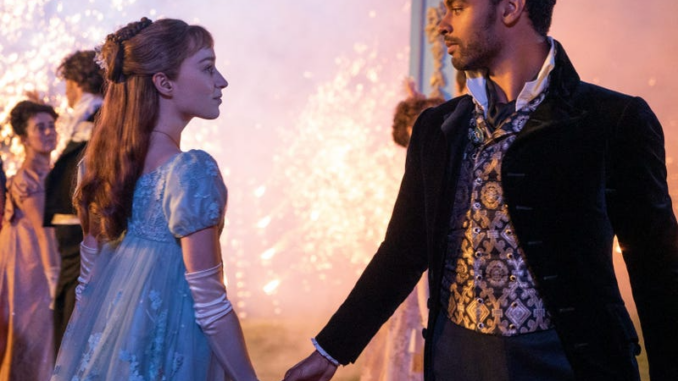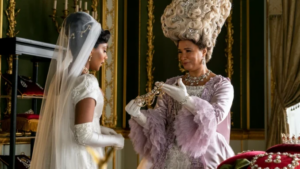
The True Story of Queen Charlotte and King George III’s Wedding
The wedding of Queen Charlotte and King George III stands as one of the most fascinating and unusual royal unions in British history. While most royal marriages were arranged for political gain, the union between Charlotte and George III offers a complex blend of genuine affection, challenges, and historical significance. In this article, we’ll take a deep dive into the true story of their wedding—exploring the events, their personal dynamics, and how this royal marriage affected both of their lives and the history of Britain.
Who Were Queen Charlotte and King George III?

Before we get into their wedding, it’s important to understand the individuals involved. Queen Charlotte, born as Princess Charlotte of Mecklenburg-Strelitz in Germany, was a young, intelligent, and well-educated princess with a deep sense of duty. King George III, on the other hand, was already the King of Britain by the time they met, a ruler deeply involved in the affairs of state.
Though George III is often remembered for his struggles with mental illness, his reign saw major events like the American Revolution and the Napoleonic Wars. Their wedding, however, was the beginning of a personal journey that shaped their future and the British monarchy itself.
How Did Queen Charlotte and King George III Meet?
The meeting between Queen Charlotte and King George III was not one born out of love at first sight. As with many royal marriages, their union was initially a practical one. Charlotte was selected as George’s bride after his parents sought to secure a German princess for him. She was chosen because of her family’s political neutrality, making her an ideal match for the British monarchy.
Their first meeting took place in 1761, when Charlotte traveled to England to meet George. At that time, she had never set foot outside of Germany, and George had seen little of the world beyond his royal duties. Despite the practicality of their union, the two would later form a deep and meaningful connection.
The Royal Wedding: A Historic Event
The wedding took place on September 8, 1761, at the Chapel Royal in St. James’s Palace in London. While royal weddings were always significant, Charlotte and George’s ceremony was unique because of the speed at which it was arranged. The marriage was announced just hours before the event, with little fanfare or preparation.
There was no time for an elaborate affair. Charlotte, having only recently arrived in England, had very little time to adjust to her new environment, let alone prepare for a wedding. She was rushed into the event, yet the ceremony was still a grand occasion, fitting for the monarchs-to-be. Despite the whirlwind nature of the event, the couple appeared united and shared a warm, genuine bond.
What Was the Atmosphere of the Wedding?
The atmosphere of the wedding was a mixture of nervousness and excitement. Charlotte, a young woman from a small German principality, found herself at the heart of the British royal court, with all eyes on her. While there was no doubt that the marriage was a political one, George III did express genuine affection for Charlotte.

The ceremony was relatively simple by royal standards. There were no extravagant displays, and much of the attention was placed on the formal aspects of the union rather than personal flourishes. Still, the union was seen as important by the court, as it ensured a new queen consort for the British throne.
The Reception and Honeymoon
After the wedding ceremony, Charlotte and George III went on to spend their honeymoon at Kew Palace, a royal residence just outside London. While many royal couples might have used this time for lavish celebrations, Charlotte and George’s honeymoon was modest. They spent the time getting to know each other better, navigating the complexities of their new life together.
It was during this time that George’s affection for Charlotte began to grow deeper. Despite the initial awkwardness and political motives surrounding their marriage, the couple found comfort in each other’s company. Charlotte’s personality and intelligence made a lasting impression on George, and their relationship evolved beyond just a formal duty.
Challenges in Their Marriage
Despite the early warmth and affection between George III and Charlotte, their marriage was not without challenges. King George III’s eventual struggle with mental illness placed a strain on their relationship. His periodic bouts of illness were a source of concern for Charlotte, but she remained a devoted wife throughout their long marriage.
Charlotte’s role as the queen consort was demanding. She had to balance her responsibilities to the British court while managing her husband’s health and supporting him through difficult times. Despite the difficulties they faced, Charlotte and George’s relationship remained strong, marked by mutual respect and affection.
Their Legacy: The Children of Queen Charlotte and King George III
One of the most important aspects of Charlotte and George’s marriage was their large family. They had 15 children together, many of whom would go on to have significant roles in British history. Some of their children became kings and queens, while others played prominent roles in politics and society.
Their large family was a testament to their commitment to each other and their country. Charlotte was a dedicated mother, and George was a caring father, though his mental health challenges sometimes interfered with his ability to parent effectively. Nonetheless, their legacy lives on through their children, who shaped British and European history.
The Final Years: A Deep and Enduring Bond
In the later years of their marriage, as George’s mental health deteriorated, Charlotte remained by his side. Her devotion to her husband, even as he faced increasing bouts of illness, was remarkable. Despite the hardships they faced, their bond grew stronger. Charlotte became a central figure in George’s life, providing stability and love during the most difficult times.
Why Their Wedding Is So Significant
The wedding of Queen Charlotte and King George III is more than just a royal union. It represents a turning point in British royal history. Their marriage was one of duty and love, filled with personal and political complexities. It was a time when royal marriages were often formed for alliances and power, yet this marriage brought unexpected depth and affection between two very different people.
Their wedding symbolizes how love can emerge from the most unlikely of circumstances, and it set the stage for one of the most enduring royal partnerships in history. Despite the pressures and challenges they faced, George and Charlotte’s marriage remained a testament to their dedication to each other and their country.
Conclusion
The true story of Queen Charlotte and King George III’s wedding is one of political necessity, personal affection, and deep historical significance. Their union was the beginning of a partnership that would endure for decades, shaped by their mutual respect and the challenges they faced together. From a whirlwind wedding to a lifetime spent navigating the complexities of royalty, their story is one of enduring love amidst the backdrop of power, politics, and duty.